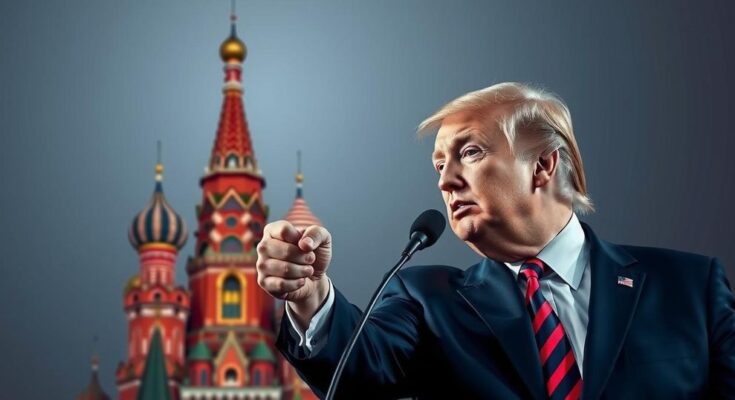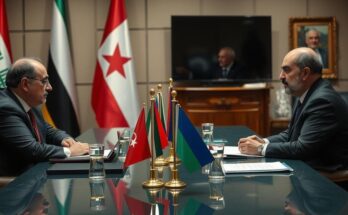Moscow’s initial enthusiasm over Donald Trump’s 2016 election victory has shifted to caution regarding a potential second term. While some see Trump as a less confrontational figure, his presidency ultimately led to significant sanctions and disappointment in Russian political circles. Current perceptions of U.S. foreign policy differ sharply between the Trump and Biden administrations, influencing public opinion in Russia, where opinions on America remain complex and varied. As the election nears, the potential ramifications for U.S.-Russian relations are significant, with many hoping for stability and peace in light of ongoing conflicts.
In the aftermath of Donald Trump’s unexpected victory in 2016, Moscow exhibited exuberant hopes for a shift in US-Russian relations, with officials and nationalists celebrating his ascension. Vladimir Zhirinovsky, a Russian ultranationalist politician, took his enthusiasm to great lengths, purchasing 132 bottles of champagne to toast the occasion. Others joined in, expressing optimism that Trump would alleviate sanctions and possibly acknowledge the annexation of Crimea. Konstantin Remchukov, a notable Russian editorial figure, captures this sentiment by noting, “The value of Trump was that he never preached on human rights in Russia”. However, disillusionment soon ensued as Trump implemented significant sanctions against Russia during his presidency, prompting many in Russia to reassess their hopes. Fast forward to the present, the cautiousness of Russian officials is palpable regarding a potential second term for Trump. President Vladimir Putin’s humorous allusion to supporting a Democratic candidate, particularly Kamala Harris, indicates a more measured stance this time around. Despite his jest, the Kremlin appears to favor Trump’s critical views on U.S. military support for Ukraine and reluctance to shoulder blame on Putin, showcasing a preference for Trump’s foreign policy approach over Harris’s, which emphasizes support for Ukraine and criticizes Russia’s actions. Moreover, amidst the chaotic political landscape in the U.S., the Kremlin might find it favorable if the election results yield intensified domestic strife, diverting attention from foreign policy issues, particularly the ongoing conflict in Ukraine. The deteriorating state of US-Russian relations over several administrations illustrates a growing chasm, with heightened animosity under Biden, who has responded to Russian actions with extensive sanctions and military aid to Ukraine. Russian public opinion collected at a well-known monument dedicated to the symbolic friendship between the U.S. and the USSR reveals a complex sentiment. While there is vocal animosity towards the U.S. from some, others express a desire for peace and collaboration, casting a favorable light on Trump’s presidency as a period without major conflicts. Interestingly, the desire for a female president in both countries reflects an unchanging gender dynamic in leadership roles, with some Russians voicing a wish for greater representation. As the election approaches, the reactions from global perspectives, including Russian citizens’, foreshadow the event’s potential implications.
The topic discusses the evolution of expectations surrounding U.S.-Russia relations contingent upon the outcome of U.S. presidential elections, particularly focusing on Donald Trump’s potential second term. Initially, Trump’s victory in 2016 sparked considerable enthusiasm in Moscow, with officials believing that his administration would favorably alter the geopolitical landscape between the two nations. However, as historical events unfolded, including the implementation of significant sanctions against Russia and the continued deterioration of relations under different administrations, the Russian response has shifted to one of caution and skepticism. This piece elucidates the contrasting visions of U.S. foreign policy between Trump and the incumbent Democratic administration, particularly concerning military support for Ukraine, and highlights the complexities of public perception in Russia, underscoring a desire for peace despite prevalent anti-American sentiments.
In summary, the article effectively illustrates the cautious optimism that characterized Russian attitudes towards Donald Trump’s initial presidency and the subsequent disappointment that ensued due to his administration’s actions. As the U.S. approaches another presidential election, the Kremlin’s stance reflects apprehension rather than exuberant hope for a Trump resurgence. Despite mixed sentiments among the Russian public regarding their views on America and leadership, the impact of U.S. policy choices on geopolitical stability remains a significant concern for both nations.
Original Source: www.bbc.com




